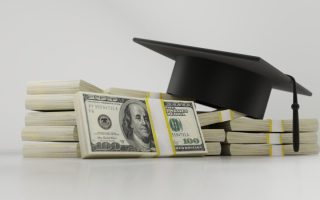For the past generation or so, lenders and financial gurus have been promoting the myth that all student loan debt should be considered Good Debt. Student loan debt is said to be good because it is debt accrued in the pursuit of an education, which is an asset that will (ideally) product more money. The theory goes that you will take out student loans, get your degree, and then get a job earning so much money that paying those loans back will be a piece of cake.
To some extent this isn’t bad thinking. An education is certainly an asset that will increase your earning power. However, the problem is that people have bought into this myth so entirely that they are coming out of even community colleges with hundreds of thousands in debt. Many people have bought into the notion of student loan debt being so good that they are even using student loans to pay everyday expenses, in addition to tuition and books. They’re getting apartments in the nicer complexes on student loans. They’re using student loans to finance entertainment and spring break trips. “Heck,” they think, “It’s student loan debt. It’s all good.”
Many people are financing educations at schools they couldn’t possibly hope to afford any other way. While there’s nothing wrong with wanting to get a degree from a prestigious university, you have to ask yourself if it’s worth it. In some fields like medicine and law, where you get the degree matters. And those fields will likely earn you enough money that paying the loans back will be feasible. But in many fields it doesn’t really matter at all. The cost of an education at an “affordable” state school is rising faster than the pace of inflation. That alone will set you back for years. Go to a private school for that degree in philosophy, rack up the debt in pursuit of a degree that won’t earn you any money, and you will be in the hole for the rest of your life.
Student loan debt isn’t good debt when it crushes all of your other hopes and dreams. When you’re so busy trying to make loan payments that you can’t afford a house, car, children, or even a pizza, you’re in trouble. And that’s just where some people who bought into the “all student loan debt is good debt” find themselves these days. Jobs are hard to come by. High paying jobs even more so. Student loans are some of the most forgiving in terms of repayment schedules, interest rates, and being willing to defer payments for a while, but even the most forgiving won’t wait forever to get their money back.
So while some student loan debt isn’t bad, you have to make sure you’re not crossing that threshold where good goes bad. What can you do?
Go to a college you can afford by taking on a moderate amount of debt: That may mean a state school, or going to community college for two years while you work to save up extra money. If it really matters where you get your degree, got to a cheaper school while you’re an undergrad and save the big loans for your graduate work. Graduate work will give you more earning power and is thus, “better debt” than that taken on for undergraduate work.
Work while you’re in school: A lot of kids still work while in school, but many don’t. Even a part time job can help offset some expenses. If you work full time during summer vacation and breaks, you can earn even more. Yes, it’s complicated and hard to juggle school and work (but it’s just as hard to juggle work and the rest of your life once you’re out of school), and it may mean reducing your course load and taking longer to graduate, but it’s better than owing hundreds of thousands of dollars when you get out.
Look for money that doesn’t have to be paid back: Instead of going straight for the loans, look for scholarships, grants, or work study programs. That kind of assistance doesn’t have to be paid back and there are programs for almost every field of study. Even small scholarships can help if you can string enough of them together. Too many people run straight for the loan officer instead of looking for other options first.
Get educated: Before you take out a loan, read all of the fine print and understand all the terms of the loan. Know when it has to be paid back and what your total payments will be. Understand how interest is calculated and what happens if you hit a rough patch and can’t make payments. Know everything you can about how that loan will affect your future before you sign. Too many people take out loans not understanding the full impact they will have on all the other things they want to do in life.
Live cheap: You want to live in the nice apartment complex and drive nice cars. And why not? Many people today (whether in school or not) have lifestyle expectations that are way out of whack with their means. When you’re in college and racking up student loans, this is not the time to blow it all on a lifestyle. This is the time to hunker down and make that money stretch as far as possible so you have to take out less and, eventually, pay back less. Live on campus, eat on campus or cook in your own kitchen, skip the expensive cell phones and gadgets, don’t take expensive spring break trips, wear old clothes, buy used books, and find any other way you can to live cheaply. You can pay for a lifestyle later when you’re earning the big bucks.
There’s always the military: Do your four-year hitch in the service and you can get on the GI Bill. Let Uncle Sam pay for your education in exchange for serving your country.
Choose a degree with earning potential: I don’t care how interested you are in philosophy, general liberal arts, or family and child development, those degrees aren’t money makers. If you’re taking on tons of debt that you need to pay back, you need a degree that will earn you money. That may mean majoring in science, computers, medicine, law, business, or some other emerging field that has high earning potential. Minor in your fun interests, but major in something that pays well.
Finish school: One of the most useless things you can do is to incur a ton of loan debt and then not finish the degree. Not only are you stuck paying on the debt, you don’t have the earning power to pay back the loans. Make sure you want to go to college in the first place and then, once you’re there, finish the program.
Student loan debt can be good, but too much of a good thing can derail the rest of your future. It’s fine to take on some student loan debt and it can be a useful tool to help you reach your aspirations. Just don’t let it get out of control. Paying off loans into your forties or fifties puts your other financial goals like retirement, saving for your own kids’ college, and buying a home in jeopardy. You want an education, not a dream-crushing debt load.

Jennifer Derrick is a freelance writer, novelist and children’s book author. When she’s not writing Jennifer enjoys running marathons, playing tennis, boardgames and reading pretty much everything she can get her hands on. You can learn more about Jennifer at: https://jenniferderrick.com/.






Comments